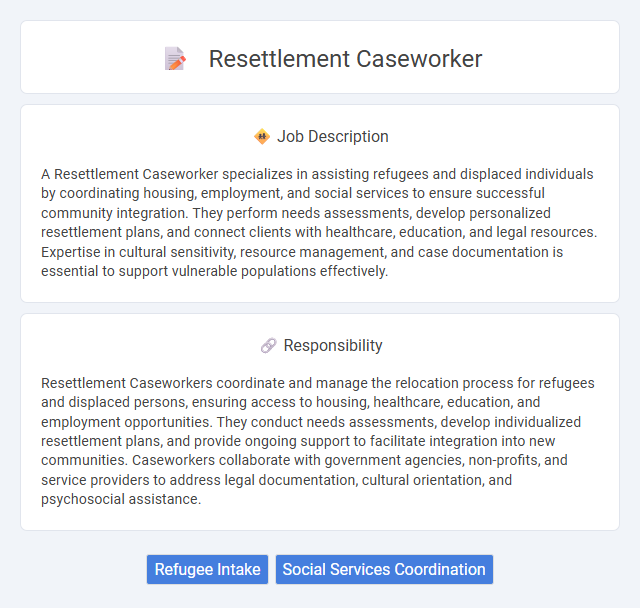
A Resettlement Caseworker specializes in assisting refugees and displaced individuals by coordinating housing, employment, and social services to ensure successful community integration. They perform needs assessments, develop personalized resettlement plans, and connect clients with healthcare, education, and legal resources. Expertise in cultural sensitivity, resource management, and case documentation is essential to support vulnerable populations effectively.
Individuals with strong empathy and resilience may be well-suited for a Resettlement Caseworker role, as the job often involves supporting vulnerable populations facing significant life changes. Those who can handle high-stress environments and demonstrate patience and cultural sensitivity are likely to adapt effectively to the challenges. People lacking emotional stability or interpersonal skills might find the demands of this position difficult to manage.
Qualification
A Resettlement Caseworker requires a strong background in social work, psychology, or related fields, often holding a bachelor's or master's degree. Proficiency in cultural sensitivity, crisis intervention, and case management software is essential to effectively support refugee and immigrant populations. Fluency in multiple languages and experience with legal frameworks governing asylum and resettlement processes significantly enhance job performance.
Responsibility
Resettlement Caseworkers coordinate and manage the relocation process for refugees and displaced persons, ensuring access to housing, healthcare, education, and employment opportunities. They conduct needs assessments, develop individualized resettlement plans, and provide ongoing support to facilitate integration into new communities. Caseworkers collaborate with government agencies, non-profits, and service providers to address legal documentation, cultural orientation, and psychosocial assistance.
Benefit
Resettlement Caseworker roles likely offer significant benefits, including opportunities for personal fulfillment through supporting vulnerable populations. The position may provide access to specialized training and professional development in social services and intercultural communication. Employees might also experience job stability in a growing sector focused on humanitarian aid and community integration.
Challenge
Resettlement Caseworker roles likely involve navigating complex legal and social systems, which can present considerable challenges in ensuring clients receive appropriate support and resources. Managing diverse caseloads with varying needs may require exceptional organizational skills and emotional resilience. The probability of encountering language barriers and cultural differences suggests further demanding adaptability and sensitivity in service delivery.
Career Advancement
A Resettlement Caseworker gains valuable experience in client assessment, cultural competency, and resource coordination, which are essential skills for career advancement in social services and humanitarian fields. Mastery of case management software and strong communication abilities enhance opportunities for promotion to supervisory or program management roles. Continued professional development through certifications in trauma-informed care and immigration law also significantly boosts prospects for leadership positions.
Key Terms
Refugee Intake
Resettlement Caseworkers specializing in Refugee Intake play a critical role in assessing the immediate needs of newly arrived refugees, coordinating housing, medical care, and essential social services to ensure a smooth transition. They conduct detailed interviews to document refugees' backgrounds and vulnerabilities, facilitating tailored support plans that align with established resettlement agency protocols. Expertise in cross-cultural communication and knowledge of immigration policies enhance their effectiveness in managing complex cases and promoting successful integration into local communities.
Social Services Coordination
Resettlement Caseworkers play a crucial role in Social Services Coordination by connecting refugees and displaced individuals with essential community resources, including housing, healthcare, and employment services. They collaborate with local agencies, government programs, and nonprofits to develop personalized support plans that promote successful integration and self-sufficiency. Their expertise in case management ensures timely access to social benefits and continuous monitoring of client progress within the resettlement process.
 kuljobs.com
kuljobs.com